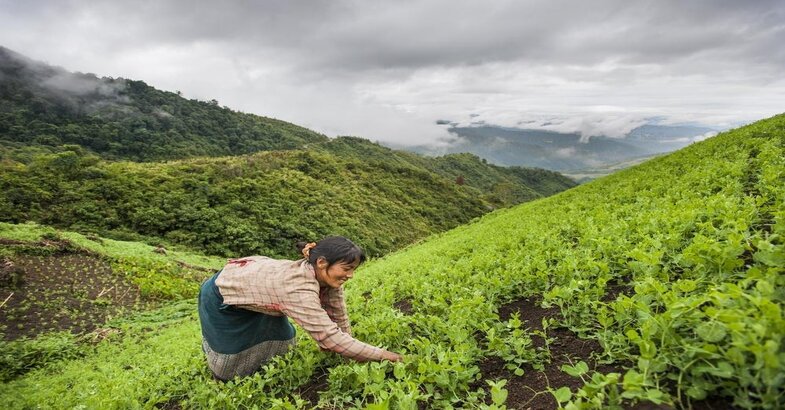
Meghalaya’s matrilineal society, while empowering women in inheritance and property rights, faces challenges in women’s participation in local governance. This blog explores the efforts of the government to address gender inequality through initiatives like the gender budget and women’s empowerment programmes. The blog, focusing on Khasi tribe, points out wage gaps women faced by women and lack of representation in decision-making roles.
Introduction
Meghalaya is well known for its matrilineal society which is followed largely by all the three major tribes, namely the Khasi, Jaintia and Garo tribes present in the state. The Khasi indigenous people of Meghalaya trace their lineage through a female line and follow the matrilocal system. This system is where the husband moves in with his wife’s matrilineal kin or the couple sets up home in a new residence in and around the wife’s maternal residence, this is also called neolocal residence pattern. While their children also take their mother’s last name.
A few countries also follow the matrilineal system. These include parts of Africa, Southeast Asia and the Nayar in South India. For example: The world’s largest matrilineal society, the Minangkabau of Sumatra, Indonesia still holds the tradition of inheritance through female lineage, while the Asante or Ashanti of Ghana inherit status and property directly from their mothers. As for the Khasi indigenous people of Meghalaya the rights of governance are with the male and the rights of the custodian and inheritance of the properties are with the female, particularly with the youngest daughter known as the “Khatduh” who has to look after the welfare of her parents.
Women’s Role in Traditional Institutions
The Dorbar is a traditional institution which is run to maintain peace and justice in society. This village administration is headed by a Rangbah Shnong (Headman), who is elected by adult male members of the society. The tribe has put in place a collective assembly of the people known as the “Dorbar Hima” and only men with beards can participate and debate in the Dorbar Hima.
When it comes to women’s participation in the local institution or governance (Dorbar), it is seen that women do not get to exercise their rights as fully as men. Why is this happening? The reason for this can be traced from the cultural norms that have been in existence right from time immemorial. The Khasi tribe has separated the roles of male and female accordingly. Women do not actively participate in the Dorbar, only male members are allowed to take part. Societal norms prevent the active participation of women in the local government’s decision-making process. It is believed that it is at the cost of neglecting their traditional home-bound responsibilities if they do so. Culturally, women are respected as mothers who transfer knowledge to a child. She is the one who takes care of the children, but women are still looked upon as the ones who have to sit within the four walls of a kitchen doing household chores.
Meghalaya’s Gender Budget
The gender budget was introduced in the year 2022. This budget policy aims at promoting gender equality and women’s empowerment through budgetary allocations and policies. This is to ensure that women get access to resources, opportunities, and services across various sectors in the state.
Through this initiative, the government aims to focus on providing support to women in co-operative societies, to facilitate market linkages to enterprises, and promoting safety and social security of women. The next step is to strive towards building participatory governance through strong community ties and decentralise planning.
Despite overall wage growth, gender pay gap still persists in Meghalaya. Women earn significantly lesser than men limiting their access to resources and opportunities.
Between 2000 and 2014, it was found that there were 116 women working in Meghalaya on an average day. The wages of women per day were far lower than those of men in 2014, with women being paid INR299.3 as against men’s INR 403.5 as wages.
In 2020-21, the gender wage gap ranged between 31 percent to 38 percent, and the same year the COVID-19 pandemic made this gap even worse at an alarming rate of 71%.
To address the fundamental rights and needs of women, the state government introduced various initiatives such as the Mother App, Farmer’s Collectivisation for Upscaling Production and Marketing System (FOCUS) in the gender budget. Through these intervention women are getting access to resources such as health, livelihood support through financial aid that is provided directly to the beneficiary.
Policies Interventions and Initiatives
With various challenges that women face, there are existing opportunities that have been initiated by the state government such as the Self-Help Groups (SHG) which encourage women to take part in banking knowledge and engage in livelihood activities. The Meghalaya State Rural Livelihood Society (MSRLS) under the National Rural Livelihood Mission (NRLM) has 4,15,175 women who have registered themselves with the Self Help Groups (SHGs) in the state.
To encourage women participation in politics, the government provides support for women to participate through SHGs and positions in Village Election Councils (VECS). This will lead to better outcomes in those domains as well as in job market, healthcare and educational performances. There has been an increase in women engagement from 5,814 SHGs in 2018 to 38,115 SHGs in 2022 which saw mobilisation of women from about 3.16 lakh households.
Secondly, the state entrepreneurship programmes, such as PRIME (Promotion and Incubation of Market-driven Enterprises hub) offers opportunities for women through incubation and market linkages programme. PRIME hub is one of the successful interventions while targeting women from both rural and urban areas, that helps them start their own enterprise or actively participate in various economic livelihood activities. Other than their home bound roles, women step out of their comfort zone to earn their livelihood and lend an extra hand in contributing to the welfare of the family.
Take the case of Trinity Saioo hailing from West Jaintia Hills district who produces the fanous organic Lakadong turmeric. She was a part of the PRIME incubation and later gained recognition for her work as she was awarded a Padma Shree. The Padma Shree awardee also encouraged farmers in her district and helped spread awareness on the importance of organic farming. She helped more than 100 SHGs to work on the production of Lakadong turmeric to reach other markets as well.
By offering various benefits and services, these interventions aimed at enhancing women’s participation in decision-making, participating in governance also meet the objective of improving the welfare of the state overall.

Author’s Bio: Lyntiborn Marngar is a fellow of the Meghalaya Legislative Research Fellowship (MLRF) of the Bharti Institute of Public Policy, Indian School of Business in collaboration with the Meghalaya Institute of Governance (MIG). She completed her Master’s in Social Work, specialising in Livelihood and Social Entrepreneurship, from Tata Institute of Social Sciences (TISS), Guwahati. Her areas of interest are entrepreneurship, education, health, and food and nutrition. She has work experience in the development sector and has worked with various NGOs in the areas of Livelihood, Skills development, Enterprise Promotion, and Education.
DISCLAIMER : The views expressed in this blog/article are author’s personal.

